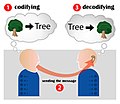|
Andrzej Bogusławski
Andrzej Stanisław Bogusławski (born 1 December 1931) is a Polish philologist, semanticist, semioticist and philosopher of language of international repute. Originally a specialist in Russian language, his interests broadened into the epistemology of language and linguistics. During martial law in Poland he was interned for refusing to sign an oath of loyalty which led to international protests. He is a professor emeritus at Warsaw University. CareerHis early work focused on Russian language and moved later to the theory of language. He became a member of the Polish Academy of Sciences philology committee, a member of the Warsaw Scientific Society, a national member of the Polish Academy of Learning, and for many years director of the faculty of Formal Linguistics at Warsaw University. Political internmentOn 13 December 1981 he was arrested and interned by the Polish authorities for refusing to sign an oath of loyalty. Noam Chomsky, among other academics, called for his release.[2] He was released on 16 July 1982. ResearchBogusławski's research interests have ranged from lexicography, through grammar, semantics, semiotics to formal logic and the roots of language in philosophy and theology. He collaborated with Anna Wierzbicka on Natural semantic metalanguage research and is credited by her with reviving the notion of Leibniz's "alphabet of human thought", or Lingua Mentalis.[3] Bogusławski is an acknowledged authority in the field of the theory of language and research methodology in the sphere of Indo-European languages, especially Slavic languages. His interests also take in semantics, lexicology, lexicography, pragmatics, syntax, inflection, neologism phonology, theories of text and translation, semiotics and the theory of literature. He has made original contributions to the methodology of semantics and to the theoretical bases of synchronistic morphology, lexicology, lexicography. In the 1960s he hypothesised the emergence of natural language generation with the aid of elementary linguistic units. In the 1970s he postulated a theory of operational grammar, relating linguistic elements to syntax. This helped to advance understanding of how the fields of internal languages are demarcated and he assisted the development of the empirical study of linguistics. He laid down the methodological basis of contemporary synchronous lexicography. He has also explored the frontiers of language and philosophy.[4] Honours
WorksBogusławski is the author of over 400 publications and the editor of the Polish-Russian and Russian-Polish dictionary. He has published in Polish, Russian and English.[8] Selected books
Selected articles
See alsoReferences
Bibliography
External links |
||||||||||||||||
Portal di Ensiklopedia Dunia

